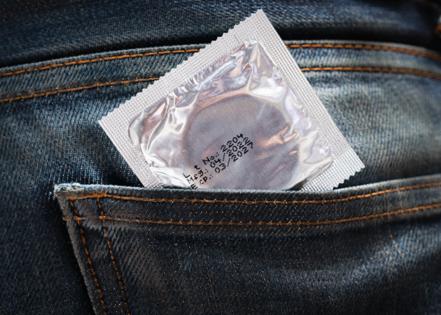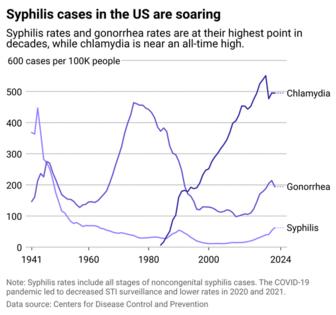Syphilis rates are at their highest since the 1960s. Here's why.
Published in Slideshow World
Subscribe
Syphilis rates are at their highest since the 1960s. Here's why.
After decades of decline, syphilis cases are on the rise again, hitting their highest levels since the early 1960s. Though the vast majority of syphilis cases are preventable, rates surged nearly 80% between 2018 and 2022, rising among all age groups and including a spike in transmission at childbirth, according to data from the Centers for Disease Control and Prevention.
Syphilis, a sexually transmitted disease caused by infections from the bacteria species Treponema pallidum, has plagued people for thousands of years. Its origins are hotly debated, but it is believed to have first spread to Europe between the 14th and 17th centuries, likely exacerbated by the drastic increase in human migration. Some scientists, including contemporary researchers at the University of Bucharest, hypothesize that humans began contracting syphilis as early as around 3000 BC.
In most cases, syphilis is curable using antibiotics, in particular penicillin, which was first successfully used to cure syphilis in 1943. Before penicillin, several treatments were employed to cure the disease, of which many, such as mercury ointments, did more harm than good.
Syphilis has four stages, each with distinct symptoms, though many people associate it with the wart-like sores that occur during the first stage. Without treatment, syphilis can have long-term effects, including internal organ and neurological damage—and even death.
Pregnant people can also transmit syphilis to their fetuses; the disease increases the likelihood of premature births and stillbirths. Babies born with syphilis are prone to abnormally low birth weight and may develop deafness, cataracts, or seizures without treatment. In the most severe cases, syphilis transmitted at birth can be fatal. Anyone who is pregnant can undergo testing for sexually transmitted infections early on so the disease can be effectively treated to reduce the risk of transmission to the fetus.
Though syphilis is often dismissed as a disease of yesteryear, cases have skyrocketed since the early 2000s. Two other bacterial STIs, chlamydia and gonorrhea, are also on the rise in the U.S. and many other countries. With the availability of effective treatment and prevention methods for these STIs, the major uptick is a source of both concern and confusion.
STD Testing Clinics examined news reports, academic research, and government data to explain why STI rates in the United States are rising dramatically.
Visit thestacker.com for similar lists and stories.
Syphilis rates ebb and flow based on social mores, science
Syphilis rates initially began to drop following World War I as testing and treatment levels rose. During WWII, however, rates spiked as interventions fell to the wayside during wartime. With the introduction of penicillin as an effective, cheap, and easy treatment—coupled with the end of the war—syphilis rates started to fall once again in the mid to late 1940s.
Rates then slowed during the sexual revolution of the early 1960s. From the 1980s to the 1990s, rates dropped once again as STI prevention became top of mind during the AIDS epidemic. Though a brief spike in syphilis cases occurred between 1986 and 1990 coinciding with surging crack cocaine use, by the year 2000 the prevalence of syphilis in the U.S. had reached a historic low, with only 31,618 cases reported that year, according to CDC data.
But shortly thereafter, the pendulum swung again, and syphilis rates began increasing at a rate of a few thousand cases per year. Between 2016 and 2017, this upward trend took a startling shift as the number of syphilis cases increased by over 10,000, from 88,055 cases to 101,591.
Another huge surge in syphilis cases occurred at the start of the COVID-19 pandemic, with annual rates increasing a startling 32%between 2020 and 2021. In 2022, an astounding 207,255 cases of syphilis were reported in the U.S.
Particularly alarming is the increase in children being born with syphilis. Congenital syphilis cases are increasing the fastest; rates grew by more than 180% between 2018 and 2022, according to the CDC. Though syphilis cases across all ages grew nearly 80% during that time frame, congenital syphilis still made up less than 2% of all cases in 2022.
A lack of public awareness contributes to surging rates
The sharp increase in STI cases may, in part, be due to the pandemic. During COVID-19, many people had a harder time accessing condoms, and fewer people used protection or received proper testing and treatment. The number of Americans that fall into higher risk categories for STIs also increased, such as those experiencing homelessness, lacking medical insurance, and using illegal substances.
Some experts posit that STI rates may also be being impacted by changing views on the importance of STI prevention, in large part due to the advancements in HIV prevention and treatment. Studies show a spike in STI rates in adults 65 and older, potentially because this population is less concerned with pregnancy prevention methods (like condom use) and is less likely to receive recent sexual health education.
What's more, in 2023 there was a shortage of one of the major antibiotics used to treat syphilis, and many states lost funding for STI programs—accelerating already high rates. A lack of public awareness about the recent rise in STIs may also be causing fewer patients to ask for STI testing and fewer doctors to perform them as part of primary care.
Despite progress, the stigma associated with syphilis lingers even today. The negative emotions around the disease often elicit fear and anxiety, which may contribute to hesitancy about being tested and treated.
According to recent CDC data, younger people and gay or bisexual men have been hit harder than their counterparts. A disproportionate number of Black and Indigenous people in the United States, populations that traditionally face additional barriers to health care, are also being impacted by STIs.
Rates also vary by region, with cities in the South and large urban centers impacted the most. In a recent survey, out of the 25 cities experiencing the largest rates of STI cases, New Orleans had by far the highest number of reported syphilis cases with roughly 4,500 cases. New York City, Phoenix, Atlanta, Los Angeles, Dallas, and Chicago are also reporting higher rates of syphilis than many other cities nationwide.
Preventing the spread of syphilis requires awareness and protection. Getting routine STI tests is key to mitigating transmission, and most doctors will order STI screening tests at the request of patients. Though there is no set guideline on how often to undergo STI screening, people at a higher risk of developing STIs, such as men who have sex with men, are recommended to receive annual testing.
Using condoms during intercourse drastically reduces the risk of developing syphilis and other STIs. Discussing someone's STI status with them before engaging in sexual acts can also help determine when you need to take precautionary steps to avoid contracting an STI.
Story editing by Alizah Salario. Additional editing by Kelly Glass. Copy editing by Tim Bruns.
This story originally appeared on STD Testing Clinics and was produced and distributed in partnership with Stacker Studio.









Comments